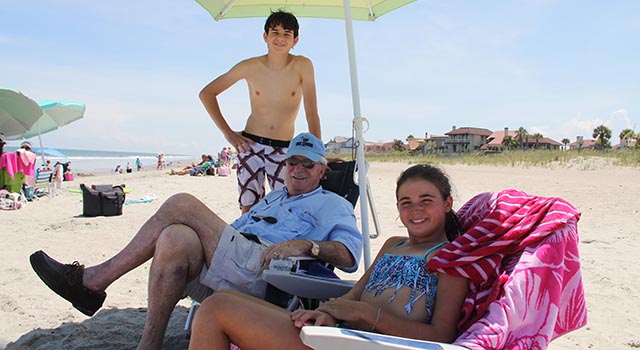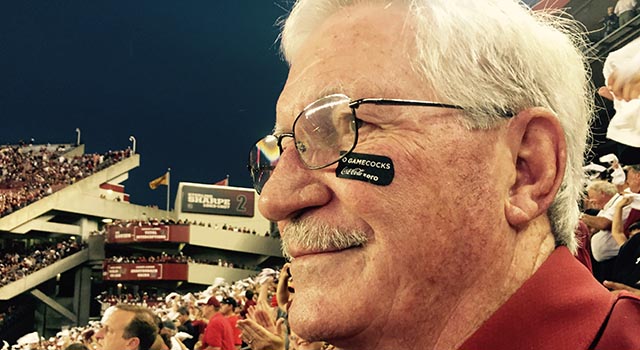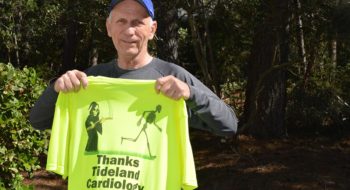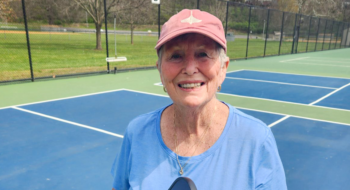Retired U.S. Army veteran Robert “Alex” Miller Jr. nearly lost his life in 1969 after being struck by an AK-47 round and shrapnel from a land mine during combat in the Vietnam War.
The 75-year-old Columbia, South Carolina, native and Citadel graduate is still suffering from infections associated with his near-death experience. Both of his legs were severely injured, particularly the left one, which was hit by gunfire and shrapnel from the explosion. Metal shards struck Miller’s body from the calves to his back.
Not the first time
While spending time in June with family at his Debordieu vacation home, another infection—this time in Miller’s left toe—sent him to the emergency department at Tidelands Georgetown Memorial Hospital. The toe was swollen and red with streaks trailing up his leg.
His wife, Anne Courtney Miller, recognized the telltale signs of a blood infection and took her husband immediately to the ER
“This isn’t the first time,” Anne Courtney Miller says. “It tends to happen, and it happens quickly.”
Featured Article
Vietnam veteran overcomes heart scares to run in Myrtle Beach Marathon
Read ArticleMiller is susceptible to infections because his war injuries compromised blood flow to his lower extremities. He has no feeling in his left leg from the knee down, and although he can feel pressure and is able to walk, he can’t feel pain when he steps on something and hurts himself.
He is unsure how he cut his toe in June, but the wound progressed to the point of a serious staph infection. Fearing MRSA, an infection that can be tough to treat because of its resistance to commonly used antibiotics, Miller headed to the emergency department at Tidelands Georgetown with trepidation and concern.
A battle
“I worked hard to keep this leg for the last 50 years,” says Miller, who has two adult children and three grandchildren. “I was not about to lose it now.”
Dr. Timothy Ryan was Miller’s attending emergency room physician at Tidelands Georgetown. Dr. Ryan was immediately concerned the infection had spread to the bone, which could require long-term, high-dose IV antibiotics and potential amputation.
“A small wound that would seem trivial to an otherwise healthy adult can be a potentially limb-threatening or life-threatening infection very quickly in a patient with Miller’s underlying condition.” Dr. Ryan says.
'I would have bled to death'
Miller almost lost his left leg in battle while serving as an artillery forward observer in southern Vietnam in 1969. His primary function was to support the infantry and call in artillery fire when needed.
His unit was battling the North Vietnamese when, in an instant, his life was changed forever. Miller suffered a gunshot wound and moments later, while carrying a fellow injured soldier toward safety, felt the blast of a detonated land mine.
“We took a good beating,” he says. “The land mine took out a lot of us. The guy I was carrying didn’t make it. He saved my life. He took a lot of the shrapnel that I would have taken had I not been carrying him.”

Spending quality time with his family is a priority for Alex Miller, who has two adult children and three grandchildren.
Miller and his unit were rescued by a helicopter, and he was taken to a hospital where he was given nearly 60 units of blood during a series of operations to repair his injuries.
On his way for treatment, he remembers brief moments of clarity when he considered the gravity of his situation.
“Had there not been a medic there in the field, I would have bled to death,” he says.
Once stable, Miller was transferred to another hospital outside of Tokyo, where he successfully battled the first of many infections in his left leg.
Memories of war linger
Although he managed to keep the leg, Miller’s military career was over. A recipient of the Purple Heart, Bronze Star and Silver Star, he still continues to battle infections like the one that sent him to Tidelands Georgetown in June.
After evaluating Miller, Dr. Ryan ordered a course of intravenous antibiotics. Miller returned to the Tidelands Georgetown ER every night for several nights to follow through with the treatment plan, which successfully cleared up the infection and allowed him to continue with his family vacation.
Dr. Ryan says he felt fortunate to have been a part of the veteran’s care.
“I feel honored to be able to provide a service to veterans when they have provided such an enormous sacrifice for our country,” he says. “Without their service, I would not be in the role I am today or be able to provide medical care in such a manner.”
Treated like family
With the infection behind him, Miller says he’s most appreciative of how Dr. Ryan and the other members of the medical team at the Tidelands Georgetown emergency department treated and cared for him.
The department’s commitment to high-quality patient care is one of the reasons it was recently recognized with the national Lantern Award, which is presented annually by the Emergency Nurses Association to emergency departments that exemplify exceptional practice and innovation. Only a handful of emergency departments across the country are selected to receive the award each year.

A Columbia, South Carolina, native, Miller is a fan of the University of South Carolina Gamecocks.
“They treated us like family,” Miller says. “The doctors and nurses I saw during my time there were absolutely superb. I could not have been given better, more attentive care.”
The gratitude was mutual.
“Mr. Miller was a model patient; he was respectful to myself and the medical staff and made it very easy to gather information from him, care for him and obtain appropriate evaluation quickly,” Dr. Ryan says. “It’s rewarding whenever I am able to make a personal connection with a patient and for them to know I am here as an advocate and to care for them as if they were members of my own family.”





